Radhika Mittal begins a new column on books...
My apologies to Jasper Forde for using the title of his wonderful novel Lost in A Good Book. But it so aptly sums up what I want to convey here.
I end up reading everything in fiction, but am biased against more ?intellectual? works non-fiction (though biographies occasionally). for pure enjoyment, and something doesn?t interest me even if it is at top of the best-seller lists -- I won?t read it.
So is there a particular genre of books I prefer? I can't say there is, though of late I have been into fantasy in a big way. But the classics, sci-fi, thrillers, historical fiction, horror, whodunits, YA (Young Adult) novels and just regular fiction (which I can't categorize) is what I like to read.
SOME in top of the mind authors different genres:
I felt I'd note my views on the books I read. Maybe you think differently and it'd be nice if you could share your views with me.
Maybe I'll interest you in some books and maybe you will recommend books to me I haven't read earlier. Lots of 'maybes' up there, isn't it :-)
Drood by Dan Simmons
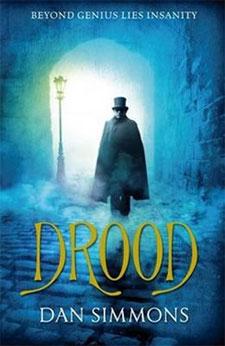
I just finished reading this 800-page tome. It is set in Victorian England and written in the voice of Wilkie Collins (the novelist who wrote The Woman in White, The Moonstone). The story revolves around Collins's friendship and professional rivalry (on Wilkie's part) with Charles Dickens and the novelists' experiences with a mysterious character called Drood.
Many readers have called the story creepy; I agree. The title is derived from Dickens' unfinished novel The Mystery of Edwin Drood. The story takes off with Dickens' encounter with a strange character called Drood at the site of a railway crash. Dickens and Wilkie pursue Drood through the sewers and the underground of London.
And therein lies the mystery: Who is Drood? Is he really immortal? Has he murdered 300 people?
Collins stumbles through much of the novel in an opium-addled haze. Drood pursues him in his nightmares and there are grisly unsolved murders. There is mesmerism, and an Egyptian angle adds further twists to the tale.
The book started well though it rambled in places with all its details about London and Dickens and Collins. By and large it held my interest until I got to the last 100 pages. What an anti-climatic end! All the build-up dissolved in a poof of smoke! I feel cheated!
Simmons has done tremendous research on both authors and the book is full of interesting details about their lives, their professional collaboration and personal relationships. I did not know that Dickens was involved in a railway accident five years before his death, or that he had a very public separation from his wife (with whom he had 10 children), or of his passion for a young actress which lasted till his death.
Since Collins is the narrator, a lot of the book reads like a personal diary and reveals his jealousy of Dickens, his drug-induced hallucinations, his imaginary doppelganger, his affairs with two women, neither of whom he married.
There are several interesting passages on the underbelly of London of that time including crypts and an entire city underground though the numerous references to the stench and volume of sewage can get overpowering. While these are interesting in themselves, the amount of detail takes away from the story.
After reading Drood, I want to read Wilkie Collins' novels The Woman in White and The Moonstone (which is considered the first detective novel). I would have given the book 3 stars on the basis of 90% of the book, but deducted ½ a star for the let-down at the end.
My rating: 2.5
I had a lot of free time this past month as I wasn't well and spent time at home. Family and friends kept me well supplied with reading material since I was devouring almost a book a day. Many of the new releases were books I wouldn't usually buy (maybe borrow) so there was quite a range I ended up reading.
The Best of Me by Nicholas Sparks
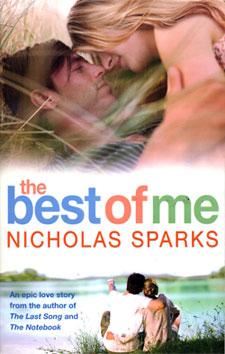
I am not a Sparks fan, so I admit to being a little biased. I did like his The Notebook when I read it many years ago. But tastes in writers change over time. Some authors are timeless, but for me NS is unfortunately not in that category.
Dawson and Amanda meet up after 25 years when they return to their hometown for a dear friend's funeral. They had been high school sweethearts, and as the blurb puts it 'from opposite sides of the tracks.' They are forced to part in tragic circumstances and have had no contact with each other till they are summoned to their friend Tuck's funeral.
Tuck seems to have planned it down to the last detail how to get the two of them together after all these years. You really need to suspend disbelief and get on with the book!
The book is about a love so strong (really!! In high school?) that Dawson has never been interested in another woman. Amanda is married and has two children, but you get the sense that she is vaguely unhappy with her life.
It is pretty predictable what's going to happen -- they get together, the sparks are still there, but Amanda has to grapple with the fact that she has a family. Someone is also trying to kill Dawson and there is a ghost he keeps seeing from time to time.
The ending is so contrived and absurd that while I spotted it a mile away I kept telling myself that NS wouldn't actually be crazy enough to attempt it.
Designed to make you weep buckets, but too sappy to work.
My rating: 1
Scarecrow and the Army of Thieves by Matthew Reilly
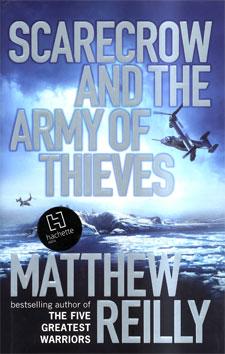 I can see this one as a movie. Reilly seems to have written it with an eye on a movie deal. Full of non-stop action, it's an exhausting read since the tension and action never let up. It reminds me of Shankar Mahadevan's song, Breathless.
I can see this one as a movie. Reilly seems to have written it with an eye on a movie deal. Full of non-stop action, it's an exhausting read since the tension and action never let up. It reminds me of Shankar Mahadevan's song, Breathless.
I haven't read the other novels in the Scarecrow series, but that doesn't take away from this book. The main events take place in a span of eight hours. The world is under threat from a terrorist army that has seized an abandoned Soviet base known as Dragon Island in the Arctic. The terrorists have activated a deadly weapon that will destroy half of Earth in a few hours.
Our only hope is a small research team of Marines and civilians (and a robot) that happen to be in the vicinity. They are not equipped to take on the terrorists, but will try anyway 'because someone has to.'
Twists and turns follow, accompanied by lots of new gadgets, hungry polar bears and rats, submarines, and sadistic terrorists. The cast is fun to watch (you feel you are watching a movie!). Scarecrow -- the book's hero, Marine Captain Schofield; Call Sign: Scarecrow -- is your typical action hero (with a tragic past) who will 'leave no man behind.'
Things get over the top especially towards the end, but you don't really care. A time-pass read.
My rating: 3
Dead Man's Grip by Peter James
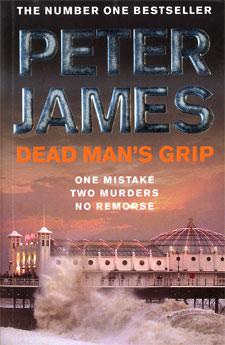
I hadn't read this British crime novelist before so I approached DMG minus expectations. I was pleasantly surprised. DMG is the seventh in the Detective Superintendent Roy Grace series, but not having read the earlier books wasn't a drawback.
Carly Chase is in a terrible accident involving two other vehicles. A young cyclist is killed and someone begins to hunt down the drivers of the vehicles involved in the crash. Two drivers are dead and it is Carly's turn next.
Grace is in a frantic hunt for the killer while dealing with a new boss who doesn't like him and a pregnant girlfriend who has complications and has to be hospitalised.
Interestingly, James pays substantial attention to Carly's character and it's not just about the detective looking for the killers. The book is not a typical whodunit since the identity of the killer is revealed fairly early he and his gruesome modus operandi is described in detail. The focus in on police investigative work and their race against time to apprehend the killer before he strikes again.
I am now intrigued to know more about Grace's personal story to which references are made through the book. The central characters are well developed though the killer and some of the secondary characters unfortunately remain caricatures.
A fast paced read with a satisfying resolution.
My rating: 3
Snuff by Terry Pratchett (with an introduction to Discworld)
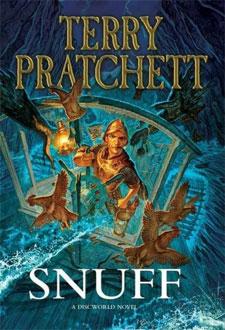 If you haven't read Terry Pratchett yet, you are missing something.
One of my favourite writers, I have an entire shelf at home devoted to his books. Most bookshops store his novels under science fiction or fantasy (if they have such a section) and that's because his stories are set in a fictional world, Discworld (which is a flat world that balances on the backs of four immense elephants which in turn stand on the back of a giant turtle that moves through space).
If you haven't read Terry Pratchett yet, you are missing something.
One of my favourite writers, I have an entire shelf at home devoted to his books. Most bookshops store his novels under science fiction or fantasy (if they have such a section) and that's because his stories are set in a fictional world, Discworld (which is a flat world that balances on the backs of four immense elephants which in turn stand on the back of a giant turtle that moves through space).
But his books are more than just fantasy -- they are hugely comic and are a satirical commentary on human behaviour with many contemporary issues parodied in them. Sir Terry (he was knighted in 2009) is, according to Wikipedia, 'currently the second most-read writer in the UK, and seventh most-read non-US author in the US.'
Snuff is the 39th book in the Discworld series and part of the City Watch sub-series. For those of you who aren't familiar with the characters you can pick up any of the books to read and they are complete in themselves. Many characters feature regularly and you can group the books into sub-series. So you have:
Snuff, which released in October, is the latest in the City Watch series. Sam Vimes, the Commander of the City Watch, has been persuaded by his wife Lady Sybil to take a long due vacation at their country estate with their young son. A city man to the core, the country with its fresh air, birds, night silences, is a strange, unnerving, place to Sam.
But the country is not as quiet and innocent as it seems. There are strange goings-on and Sam seems to be ruffling quite a few feathers -- after all, a policeman on holiday is still a policeman. Goblins are introduced for the first time in the series as an oppressed species treated by everyone as vermin. Sam is framed for murder and must get to the bottom of the mystery.
In some ways Snuff is a much darker novel than Pratchett's earlier works. Some events are only referred to and never really shown, but they are truly horrific. Sam takes up cudgels on behalf of the oppressed species and his journey takes him through goblin caves, river boats riding through a storm right up to the city of Quirm and back.
I loved this book. It has all the Pratchettian elements -- great characters, sparkling writing, the underlying morality and good's triumph over evil. I have a few quibbles though. Sam Vimes's most endearing characteristic in the earlier books has been his portrayal as a man who has his failings, but is essentially a decent chap. Snuff turns him into a kind of superman. I missed the other characters of the Watch. They made cameo appearances throughout Snuff, but I could have done with more of the old team.
Overall: Thoroughly engaging! I tried to slow down my reading so that I could stay with Snuff for a bit longer.
My rating: 4









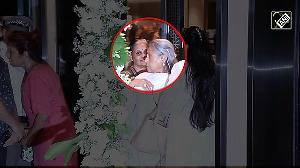

 © 2025
© 2025